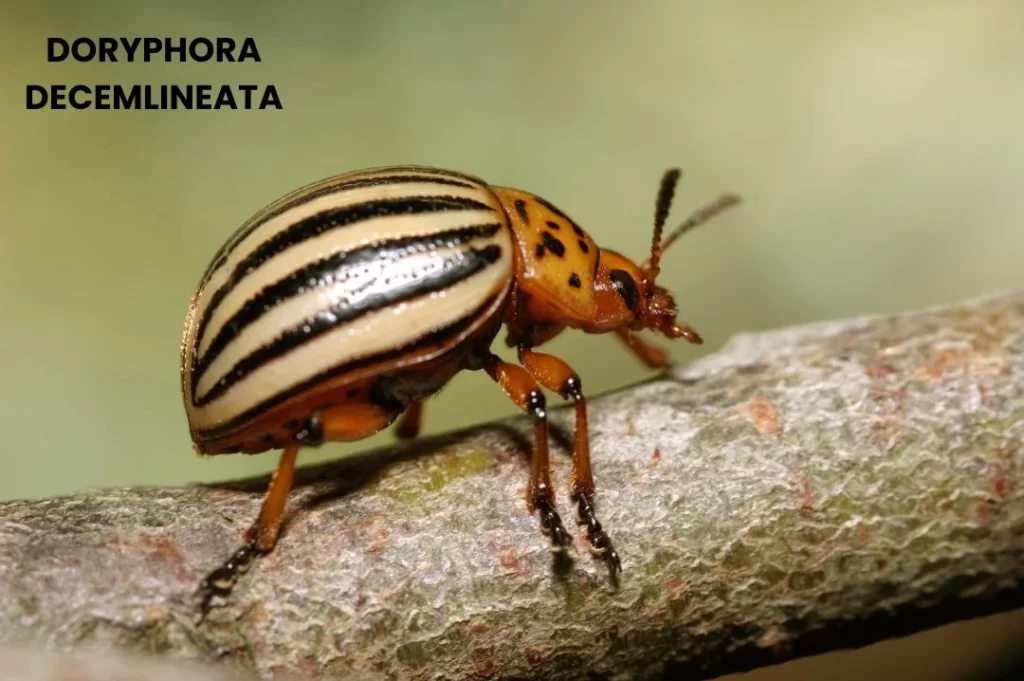Doryphora decemlineata, commonly known as the Colorado Potato-bug, is a beetle native to North America.
Known for its rapid reproductive rate and significant impact on potato crops, this insect has become a notable agricultural pest.
In homeopathy, Doryphora decemlineata is utilized for its potent effects on the urinary system, effectively treating conditions like gonorrhea, urethritis, and gleet.
This remedy is particularly beneficial for symptoms involving severe pain, inflammation, and urinary difficulties, making it a valuable addition to homeopathic treatments.

SOURCE INFORMATION
- Kingdom: Animalia
- Phylum: Arthropoda
- Class: Insecta
- Order: Coleoptera
- Family: Chrysomelidae
- Genus: Leptinotarsa
- Species: L. decemlineata
- Common Name: Colorado Potato-bug
Origin
Doryphora decemlineata, commonly known as the Colorado Potato-bug, is a beetle native to North America.
It primarily feeds on the leaves of potato plants and other members of the nightshade family.
The insect was first identified in the early 19th century and has since become a significant agricultural pest due to its rapid reproductive rate and voracious appetite.
Historical Facts
- Discovery: The Colorado Potato-bug was first documented in the early 1800s.
- Its significant impact on agriculture, particularly potato crops, led to extensive study and the development of various control measures.
- Pest Status: By the mid-19th century, the beetle had spread widely across North America, leading to significant crop damage, and prompting extensive research into pest control methods.
- Homoeopathic Use: In homeopathy, Doryphora decemlineata is used for its specific action on the urinary organs and its ability to treat conditions such as gonorrhoea, urethritis, and related symptoms.
Homoeopathic Application
- Doryphora decemlineata is primarily used in homeopathy for its effects on the urinary system.
- It is employed to treat conditions such as gonorrhoea, urethritis, and gleet, especially when these conditions involve significant local irritation and inflammation.
DRUG PATHOGENESIS
- Doryphora decemlineata acts primarily on the urinary organs, causing symptoms such as difficult urination, inflamed urethra with severe pain, and pain in the back and loins.
- It also causes significant trembling in the extremities and general prostration, along with a burning sensation throughout the body.
KEY CHARACTERISTICS
- Urinary Symptoms: Difficult and painful urination, inflammation of the urethra, excruciating pain when urinating, and pain in the back and loins.
- General Symptoms: Severe trembling in the limbs, prostration, swelling of the body, and a burning sensation.
DETAILED ORGAN SYMPTOMS
URINARY SYSTEM
- Difficult Micturition: Difficulty in passing urine, often accompanied by pain and a sense of urgency.
- Urethritis: Inflammation of the urethra with excruciating pain during urination. This is often seen in children due to local irritation.
- Back and Loins Pain: Pain in the lower back and loins, often associated with urinary tract issues.
EXTREMITIES
- Trembling: Severe trembling in the limbs, indicating a significant impact on the nervous system.
GENERAL SYMPTOMS
- Prostration: Extreme physical weakness and fatigue.
- Swelling: Generalized swelling of the body.
- Burning Sensation: A burning feeling that can affect various parts of the body.
RELATIONSHIP WITH OTHER DRUGS
- Antidote: Stramonium (Stram.)
- Compare with: Agaricus, Apis, Cantharis, Lachesis, and Coccion. These remedies share similarities in symptoms such as inflammation, pain, and urinary tract issues.
DOSE
- Typically prescribed in potencies ranging from the sixth to the thirtieth.
Frequently Asked Questions
What is Doryphora decemlineata used for in homeopathy?
- Doryphora decemlineata is used primarily for urinary tract issues such as gonorrhoea, urethritis, and gleet.
- It is particularly effective when these conditions are accompanied by severe pain, inflammation, and difficulty urinating.
What are the main symptoms treated by Doryphora decemlineata?
- The main symptoms treated include difficult and painful urination, inflamed urethra, pain in the back and loins, severe trembling in the limbs, general prostration, swelling, and a burning sensation throughout the body.
How is Doryphora decemlineata administered?
- It is usually administered in potencies ranging from the sixth to the thirtieth, depending on the severity of the symptoms and the individual’s response to the remedy.
Meaning of Difficult Words
- Gonorrhoea: A sexually transmitted infection caused by the bacterium Neisseria gonorrhoeae.
- Gleet: A chronic discharge from the urethra.
- Urethritis: Inflammation of the urethra, often causing pain and difficulty in urination.
- Micturition: The act of urination.
- Prostration: Extreme physical weakness or exhaustion.
- Antidote: A substance that counteracts the effects of a poison or a specific drug.
This detailed source information on Doryphora decemlineata provides a comprehensive understanding of its scientific background, historical context, and homoeopathic applications, ensuring its proper use in treating specific urinary and systemic conditions.
